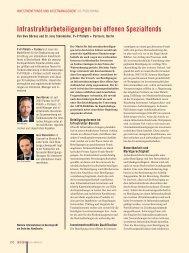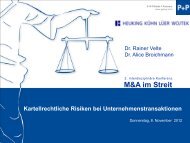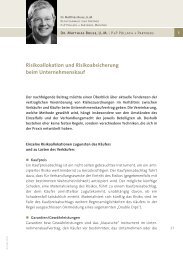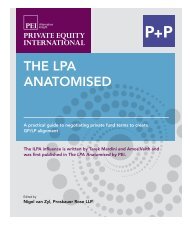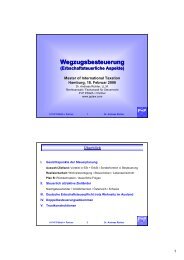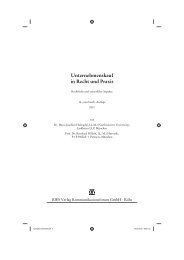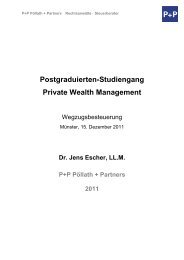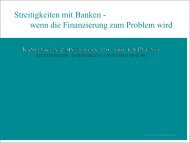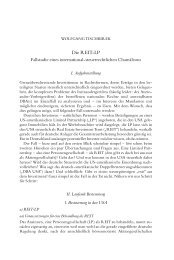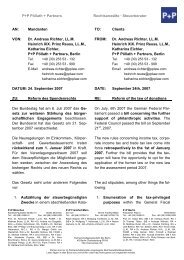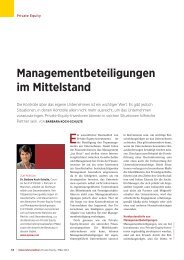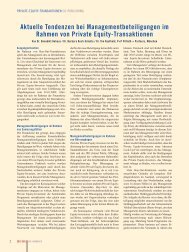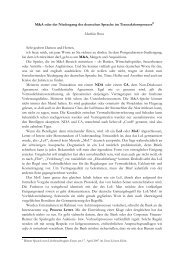Investissements étrangers en Allemagne Foreign Investments in ...
Investissements étrangers en Allemagne Foreign Investments in ...
Investissements étrangers en Allemagne Foreign Investments in ...
You also want an ePaper? Increase the reach of your titles
YUMPU automatically turns print PDFs into web optimized ePapers that Google loves.
Action <strong>en</strong> justice et Arbitrage<br />
Litigation and Arbitration<br />
deux parties.<br />
En droit allemand de l’arbitrage, il est obligatoire<br />
que toutes les parties soi<strong>en</strong>t traitées sur un pied<br />
d’égalité et qu’il leur soit donné une chance égale<br />
de faire valoir leurs droits. Les avocats tant allemands<br />
qu’étrangers peuv<strong>en</strong>t agir <strong>en</strong> tant que conseils<br />
devant les tribunaux arbitraux. Au total, les<br />
dispositions du droit allemand de l’arbitrage confèr<strong>en</strong>t<br />
aux parties un degré maximum d’autonomie<br />
eu égard àl’organisation delaprocédure. Bi<strong>en</strong> que<br />
la loi stipule trois arbitres, si les parties n'<strong>en</strong> décid<strong>en</strong>t<br />
pas autrem<strong>en</strong>t, elles peuv<strong>en</strong>t se mettre<br />
d’accord sur un seul arbitre, par ex. pour réduire<br />
les coûts. Comme il n’y apas de dispositions statutaires<br />
fixes concernant les honoraires des arbitres,<br />
les parties et les arbitres doiv<strong>en</strong>t s’accorder sur les<br />
honoraires (par ex. d’après les frais etdép<strong>en</strong>s de<br />
l’action <strong>en</strong> justice ou <strong>en</strong> se fondant sur les règles<br />
du DIS).<br />
En <strong>Allemagne</strong>, les Tribunaux régionaux supérieurs<br />
décid<strong>en</strong>t si une s<strong>en</strong>t<strong>en</strong>ce arbitrale peut être annulée<br />
ou non. Toutefois, les motifs d’annulation doiv<strong>en</strong>t<br />
se conformer aux normes <strong>in</strong>ternationales<br />
comparables.<br />
b) Les règles d’arbitrage etl’Institut allemand<br />
d’arbitrage<br />
Le DIS, la pr<strong>in</strong>cipale <strong>in</strong>stitution allemande<br />
d’arbitrage, et ses règles d’arbitrage, qui ont été<br />
modifiées le1er juillet 1998, représ<strong>en</strong>t<strong>en</strong>t un système<br />
de réglem<strong>en</strong>tation efficace et prouvé, qui<br />
peut être appliqué simplem<strong>en</strong>t <strong>en</strong> utilisant la clause<br />
d’arbitrage standard recommandée par l’Institut.<br />
Les règles duDIS sont actuellem<strong>en</strong>t disponibles <strong>en</strong><br />
sept langues.<br />
Les règles duDIS sont basées aussi sur laLoi type<br />
de la CNUDCI. Le DIS fournit un souti<strong>en</strong> adm<strong>in</strong>istratif<br />
p<strong>en</strong>dant laprocédure d’arbitrage, par exemple<br />
p<strong>en</strong>dant laconstitution du tribunal arbitral, lors de<br />
la transmission des conclusions des parties ou<strong>en</strong><br />
cas dedésignation d'arbitres suppléants. Selon les<br />
règles duDIS, lelieu d’arbitrage peut être choisi<br />
selon son gré, de sorte que les parties étrangères<br />
peuv<strong>en</strong>t transporter les règles deprocédure au lieu<br />
qu’elles ont choisi pour l’arbitrage.<br />
Àmo<strong>in</strong>s que les parties n’ai<strong>en</strong>t fait un choix différ<strong>en</strong>t,<br />
trois arbitres statu<strong>en</strong>t sur l’affaire. Par comparaison<br />
aux règlem<strong>en</strong>ts d’arbitrage allemands prévus<br />
par laloi, les règles duDIS offr<strong>en</strong>t l’avantage<br />
d’<strong>in</strong>clure un règlem<strong>en</strong>t dans le cas où plus de deux<br />
parties sont impliquées dans undiffér<strong>en</strong>d particulier.<br />
Les problèmes qui surgiss<strong>en</strong>t souv<strong>en</strong>t par le<br />
biais d’une telle constellation, par exemple, lors de<br />
la désignation dutribunal arbitral, sont facilem<strong>en</strong>t<br />
résolus grâce aux règles duDIS.<br />
In German arbitration law, it is mandatory that all<br />
parties betreated equally and giv<strong>en</strong> equal opportunity<br />
to pres<strong>en</strong>t their case. It is possible for both<br />
German and foreign attorneys-at-law toappear as<br />
counsel before arbitral tribunals. In total, the provisions<br />
of the German arbitration law bestow a<br />
maximum degree of autonomy on the parties with<br />
regard to the organization of the proceed<strong>in</strong>gs.<br />
Although the law stipulates three arbitrators, if the<br />
parties do not determ<strong>in</strong>e otherwise, they may<br />
agree upon as<strong>in</strong>gle arbitrator, e.g. to save costs.<br />
As there are nofixed statutory provisions regard<strong>in</strong>g<br />
the arbitrators’ fees, the parties and the arbitrators<br />
have to agree upon the fees (e.g. on the<br />
basis ofthe costs for court proceed<strong>in</strong>gs oronthe<br />
basis ofthe DIS rules).<br />
In Germany, the Higher Regional Courts determ<strong>in</strong>e<br />
whether anarbitral award may be reversed<br />
or not. However, the grounds for reversal must<br />
comply with comparable <strong>in</strong>ternational standards.<br />
b) The Arbitration Rules of the German Institution<br />
of Arbitration<br />
The DIS, Germany’s lead<strong>in</strong>g <strong>in</strong>stitution for arbitration,<br />
and its arbitration rules, which were am<strong>en</strong>ded<br />
on July 1, 1998, repres<strong>en</strong>t an effici<strong>en</strong>t and prov<strong>en</strong><br />
system of regulations which may be simply applied<br />
by us<strong>in</strong>g the standard arbitration clause<br />
recomm<strong>en</strong>ded by the Institution. The DIS rules<br />
are curr<strong>en</strong>tly available <strong>in</strong> sev<strong>en</strong> languages.<br />
The DIS rules are also based on UNCITRAL<br />
Model Law. DIS provides adm<strong>in</strong>istrative support<br />
dur<strong>in</strong>g arbitration proceed<strong>in</strong>gs, for example dur<strong>in</strong>g<br />
the formation of the arbitral tribunal, dur<strong>in</strong>g the<br />
transmission ofparty plead<strong>in</strong>gs or<strong>in</strong>case substitute<br />
arbitrators must be appo<strong>in</strong>ted. Accord<strong>in</strong>g to<br />
the DIS Rules, the place of arbitration may be<br />
chos<strong>en</strong> atwill, such that foreign parties can transport<br />
the rules of procedure to their chos<strong>en</strong> place<br />
of arbitration.<br />
Unless the parties have chos<strong>en</strong> otherwise, three<br />
arbitrators determ<strong>in</strong>e the outcome of the case. In<br />
comparison tostatutory German arbitration regulations,<br />
the DIS rules offer the advantage that they<br />
<strong>in</strong>clude aregulation for acase <strong>in</strong>which there are<br />
more than two parties <strong>in</strong>volved <strong>in</strong> a particular<br />
dispute. Problems that oft<strong>en</strong> arise through such a<br />
constellation, for example wh<strong>en</strong> appo<strong>in</strong>t<strong>in</strong>g the<br />
arbitral tribunal, are easily solved through the DIS<br />
rules.<br />
108



